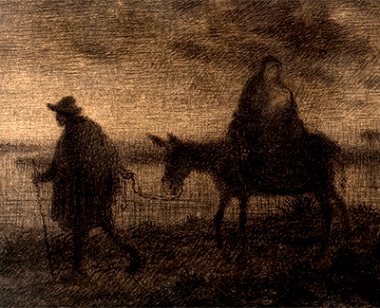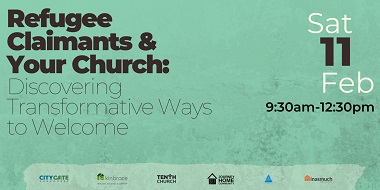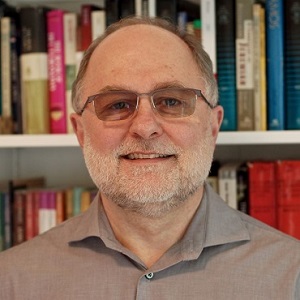![]() Creating Conversation is a weekly editorial, curated by the Centre for Missional Leadership (CML), which gives opportunity for people to speak about issues they believe are vital for the church in Vancouver.
Creating Conversation is a weekly editorial, curated by the Centre for Missional Leadership (CML), which gives opportunity for people to speak about issues they believe are vital for the church in Vancouver.
One of the goals of this weekly article is to spark dialogue – and action. We invite you to join the dialogue here on the Church for Vancouver website.
We also invite you to use the article as a discussion starter with your small group, church staff, friends and your neighbours. Thanks for participating in the conversation!
One of the more under-the-radar features of the story of Jesus’ birth is the reality that Mary and Joseph had to flee their home country to protect Jesus from the violence of Herod’s regime.
Mary and Joseph’s experiences as refugees was not new to the people of God: In fleeing oppression, Mary and Joseph and their baby Jesus recapitulated the story of their own people fleeing Egypt. Seeking asylum has been the plight of many people who sought to follow the way of God.
Recall for a moment the reality of Joseph and Mary’s refugee experience. Herod, the ruler of Palestine, a self-protective powermonger who made himself king, heavily taxed the people to build the temple and gain favour with the Jewish people – only to be become public enemy number one by the end of his rule. Before his imminent death, he ordered that certain nobles of Jerusalem be put to death so there would be mourning when he died. Herod was an oppressor.
 So when Herod gets word that there is a boy born with kingly notions around him, he sends the Magi searching for the child to let him know when they find him – so he can eliminate him.
So when Herod gets word that there is a boy born with kingly notions around him, he sends the Magi searching for the child to let him know when they find him – so he can eliminate him.
When these wise men are warned in a dream not to return to Herod, he realizes his plan has not worked out as he intended and carries out a brutal abuse of power.
Matthew describes his actions:
Herod, when he realized that the scholars had tricked him, flew into a rage. He commanded the murder of every little boy two years old and under who lived in Bethlehem and its surrounding hills. – Matthew 2:16
All of which leads Mary and Joseph to take flight to Egypt as political refugees from this tyrant ruler.
Worldwide glut of refugees
According to the United Nations Refugee Agency, more than 103 million people have been displaced from their homes. While just over half of those are internally displaced within their own countries, more than 32 million have fled their countries – and are now in refugee camps or in transit.
Five million of these are in a different nation right now seeking asylum. This year alone, more than 70,000 asylum seekers will arrive in Canada asking for refugee protection
The role of the church
 From its earliest days, the church has provided care and safety for people seeking refuge. From the Old Testament “cities of refuge” (Deuteronomy 19) to caring “for widows and orphans” in the early church (in James 1:27, for example) – and in the brightest moments of church history – people seeking to follow God’s call on their lives have cared for people seeking asylum.
From its earliest days, the church has provided care and safety for people seeking refuge. From the Old Testament “cities of refuge” (Deuteronomy 19) to caring “for widows and orphans” in the early church (in James 1:27, for example) – and in the brightest moments of church history – people seeking to follow God’s call on their lives have cared for people seeking asylum.
We are privileged in Metro Vancouver to have a number of organizations like Kinbrace, Journey Home, the Christian Reformed Church and Inasmuch that have been faithfully supporting asylum seekers for many years.
These organizations have learned a considerable amount about healthy engagement with people seeking refuge and have developed a host of best practices. We also have many churches in the Lower Mainland who have sponsored refugees and have advocated for and supported asylum seekers.
A learning opportunity
On Saturday February 11, 2023, CityGate is partnering with these refugee organizations to learn together about these creative ways of engaging and supporting refugee claimants, both through partnering with one of these refugee agencies and by developing your own church’s efforts.
For details on ‘Refugee Claimants & Your Church,’ go to the CityGate website where you can find registration information.
The learning on this day will be very concrete and practical. I believe this gathering can both initiate those churches that are new to involvement with refugee claimants and deepen the practice of those who are further along.
By learning together with people who have lived through the refugee claimant experience, from those welcoming churches and from frontline communities engaging asylum seekers, your church will have an opportunity to both enlarge your imagination and to build your capacity for accompanying refugee claimants.
Solidarity with Jesus
As we enter into the Advent and Christmas seasons, we once again are invited – and challenged – to live in solidarity with our Saviour. We are called to join in solidarity with Jesus by joining the millions since his day who have been forced to flee their homeland.
What better way to celebrate Christmas and join in solidarity with Jesus than by befriending those who, like Jesus, have fled oppression in their homeland? If you do, this could be one of your best Christmases ever!

Tim Dickau
Rev. Dr. Tim Dickau serves as CML Associate for the Missional Leadership Certificate Program, as well as Director of CityGate Leadership Forum.
Prior to taking on these roles, Tim served for 30 years as pastor of Grandview Church in East Vancouver, where he was recognized as an effective missional leader.
Tim’s congregational work helped established a deep connection in the neighbourhood, birthed economic development through social enterprises, built a 28 unit community housing project and nurtured a ‘thick community’ of disciples who shared life together and deepened their faith in Jesus through confession and repentance.
He is the author of Plunging into the Kingdom Way and Forming Christian Community in a Secular Age: Recovering Humility and Hope.

[…] This article was also published in ChurchforVancouver […]
“Herod, the ruler of Palestine, a self-protective powermonger who made himself king.”
Herod was not the ruler of Palestine, nor did he make himself king. Herod was the king of Judea. His authority was granted to him by Rome (history is always more complicated than can be summed up in a sentence or two). Palestine did not exist in the first century.
After the second Roman / Jewish war (135 – 136 ACE), the emperor Hadrian changed the name of Judea (land of the Jews) to Palestina (land of the Philistines). This was a taunt to delegitimize his enemies.
To say Herod was the ruler of Palestine is akin to saying Catherine the Great was the Empress of the Soviet Union.